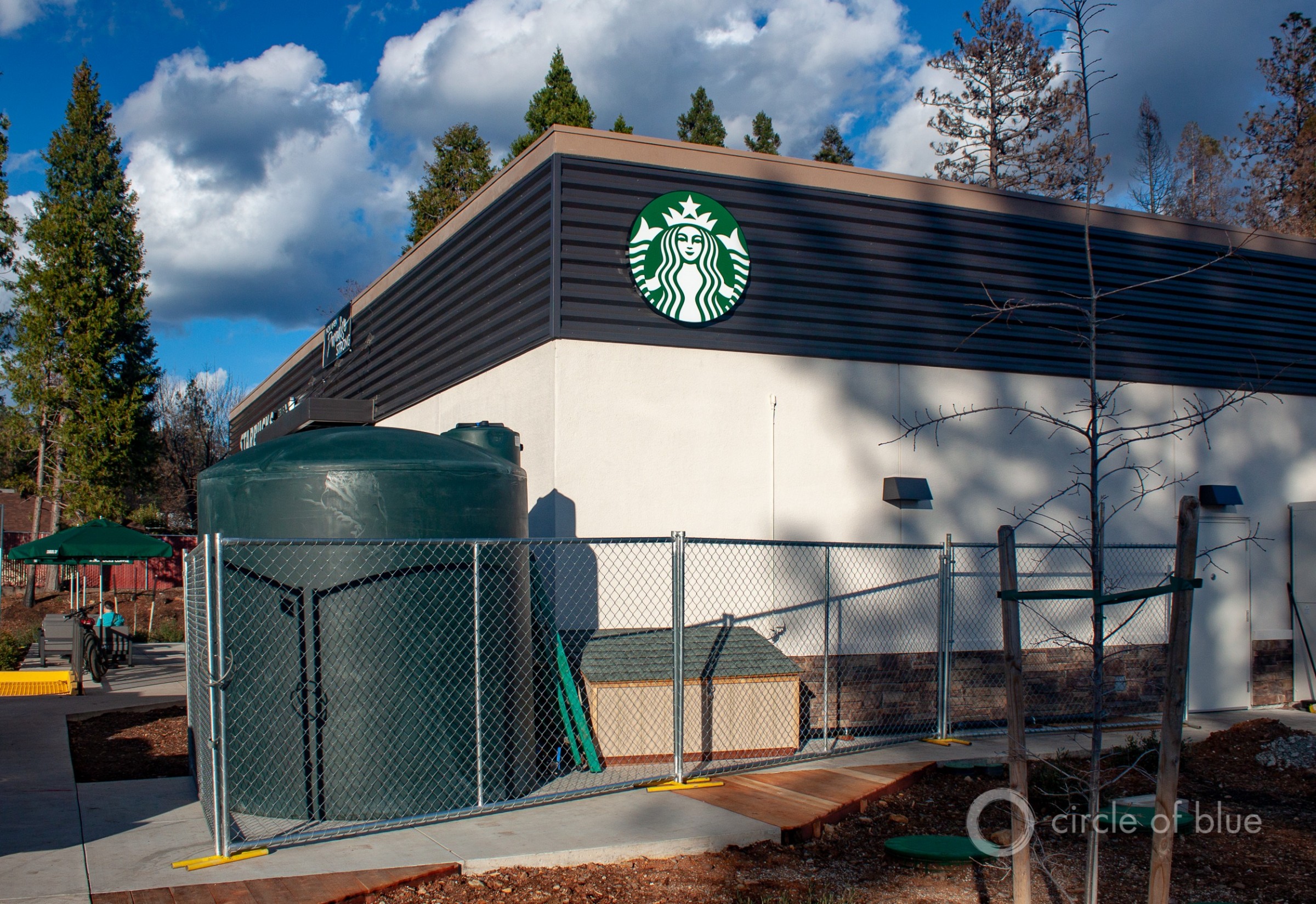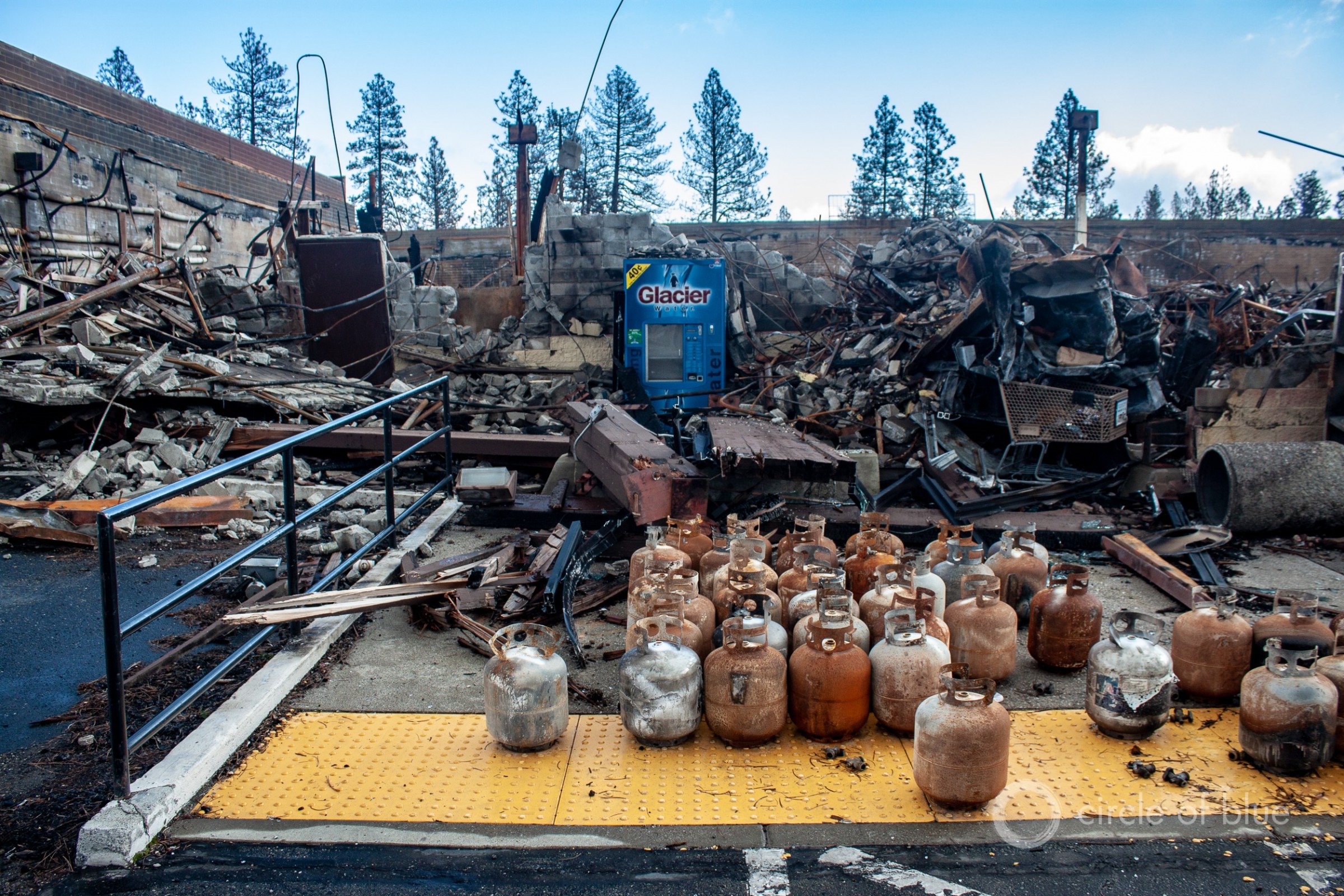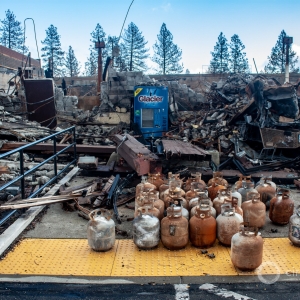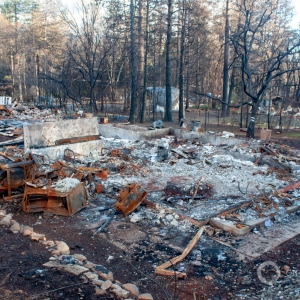County health department requires trucked-in water for restaurants.

Businesses that serve food are not allowed to use Paradise’s tap water. The Butte County Health Department says they must install water storage tanks, like the one in front of Starbucks. The tanks are filled by a licensed water trucking company that sources its water from a municipal water system that meets state and federal drinking water standards. Photo © Brett Walton/Circle of Blue
By Brett Walton, Circle of Blue
PARADISE, California — The lunch crowd, though smaller than usual, is back at Sophia’s Thai Cuisine.
The eatery on Skyway Road is the first full-service restaurant to reopen in Paradise since the Camp Fire destroyed 90 percent of the town, last November. Sophia’s reopened on February 8, three months after the fire.
“Business is OK,” Lok Keobouahom, the restaurant owner, told Circle of Blue while taking a break from seating customers. “It’s mostly regulars coming back.”
Finding a water source is one of the hurdles that Sophia’s and other food-service businesses have to overcome. Restaurants are not allowed to use tap water to prepare meals, wash dishes, and fill water glasses. Paradise’s badly damaged drinking water distribution pipes are contaminated with benzene, toluene, and other volatile organic chemicals that were set loose by the fire.
The Paradise Irrigation District, the town water utility, issued an order not to drink the tap water or boil it. Butte County Environmental Health, a division of the health department, followed that edict with its own water-sourcing rules for businesses that want to reopen.
The health department recognizes three categories of permits: businesses that do not sell food, those that sell only prepackaged food like Starbucks, and those, like Sophia’s, that prepare food.
Businesses that do not prepare food must post signs saying that tap water is not potable. At the Rite Aid on Clark Road, there are ‘Do not drink the water’ signs above the faucets in the store’s ice cream scoop shop. The scoop shop is closed for now because it needs running water, said Josh Lindsey, the store manager.
Rite Aid opened on February 11. Lindsey told Circle of Blue that the store required fresh paint and a new ceiling. He scrapped the store’s inventory because of fire damage. Stockers were refilling shelves that were noticeably thin of products.

A Safeway grocery store in Paradise’s Old Town Plaza was reduced to rubble. Photo © Brett Walton/Circle of Blue
Food-service businesses, on the other hand, have to invest in temporary water systems. Butte County Environmental Health does not allow them to install individual treatment units to purify the town’s tap water. Businesses must deploy large storage tanks that are filled by a licensed water hauling company that sources water from a community system that meets state and federal drinking water standards.
Keobouahom said that his temporary system cost $6,000 for a 2,500 gallon tank and a compressor. He gets a refill from Butte Water Truck Service roughly every week.
Just down the road Starbucks installed a 3,000 gallon water tank. On a late February afternoon, the shop was filled with locals and construction workers who are clearing debris and restoring electrical, internet, and phone services to the town.
Businesses that do install a temporary water system must contact the health department, said Lisa Almaguer, a spokesperson. That way the county can inspect the system to check that it was properly installed, and make sure the business has procedures for monitoring the water for bacteria.
Brett writes about agriculture, energy, infrastructure, and the politics and economics of water in the United States. He also writes the Federal Water Tap, Circle of Blue’s weekly digest of U.S. government water news. He is the winner of two Society of Environmental Journalists reporting awards, one of the top honors in American environmental journalism: first place for explanatory reporting for a series on septic system pollution in the United States(2016) and third place for beat reporting in a small market (2014). He received the Sierra Club’s Distinguished Service Award in 2018. Brett lives in Seattle, where he hikes the mountains and bakes pies. Contact Brett Walton





